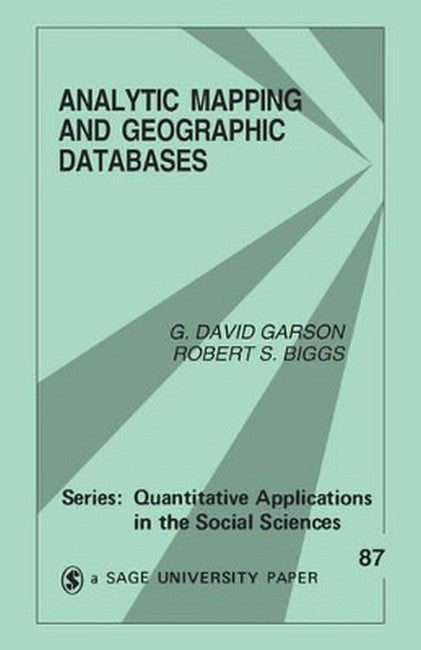G. David Garson is a full professor of public administration at North Carolina State University, where he teaches courses on advanced research methodology, geographic information systems, information technology, e-government, and American government. In 1995 he was recipient of the Donald Campbell Award from the Policy Studies Organization, American Political Science Association, for outstanding contributions to policy research methodology and in 1997 of the Aaron Wildavsky Book Award from the same organization. In 1999 he won the Okidata Instructional Web Award from the Computers and Multimedia Section of the American Political Science Association, in 2002 received an NCSU Award for Innovative Excellence in Teaching and Learning with Technology, and in 2003 received an award "For Outstanding Teaching in Political Science" from the American Political Science Association and the National Political Science Honor Society, Pi Sigma Alpha. In 2008 the NCSU Public Administration Program was named in the top 10 PA schools in the nation in information systems management. Prof. Garson is editor of and contributor to Handbook of Public Information Systems, Third Edition.(2010); Handbook of Research on Public Information Technology (2008), Patriotic Information Systems: Privacy, Access, and Security Issues of Bush Information Policy (2008), Modern Public Information Technology Systems (2007), and author of Public Information Technology and E-Governance: Managing the Virtual State (2006), editor of Public Information Systems: Policy and Management Issues (2003), coeditor of Digital Government: Principles and Practices (2003), coauthor of Crime Mapping (2003), author of Guide to Writing Quantitative Papers, Theses, and Dissertations (Dekker, 2001), editor of Social Dimensions of Information Technology (2000), Information Technology and Computer Applications in Public Administration: Issues and Trends (1999) and is author of Neural Network Analysis for Social Scientists (1998), Computer Technology and Social Issues (1995), Geographic Databases and Analytic Mapping (1992), and is author, coauthor, editor, or coeditor of 17 other books and author or coauthor of over 50 articles. He has also created award-winning American Government computer simulations, CD-ROMs, and six web sites for Prentice-Hall and Simon & Schuster (1995-1999). For the last 28 years he has also served as editor of the Social Science Computer Review and is on the editorial board of four additional journals. His widely-cited online textbook, Statnotes: Topics in Multivariate Analysis (2006-2009), is used by over 1.5 million people a year. Professor Garson received his undergraduate degree in political science from Princeton University (1965) and his doctoral degree in government from Harvard University (1969).
Request Academic Copy
Please copy the ISBN for submitting review copy form
Description
Introduction Geographic Databases Map Graphics Analytic Mapping Conclusion
"Geographic Information Systems are among the hottest new tools in business and government circles. While social scientists are hardly strangers to these methodologies, there are a host of as yet untried applications. David Garson and Robert Biggs have made this easier by writing an exceptionally clear and helpful invitation to this new technology for social scientists. This short (90 pages) monograph reviews the fundamentals and provides a set of additional statistical tools to enhance the utility of GIS programs for social scientists. . . ." -- John G. McNutt * Evaluation Practice *

